Imagine waking up one morning to find your dental implant feeling loose or uncomfortable. After investing thousands of dollars in what you thought was a permanent solution, the last thing you want to face is additional problems. The good news? Most dental implant issues can be successfully repaired when caught early and treated by the right professional.
Dental implants boast an impressive 95-98% success rate, but like any medical device, they can occasionally require maintenance or repair. Whether you’re dealing with a loose crown, gum inflammation, or more serious complications, understanding your options for dental implant repair can save you time, money, and unnecessary stress.
Key Takeaways
- Early detection is crucial – Most dental implant problems can be resolved effectively when identified and treated promptly
- Professional diagnosis is essential – What seems like a major issue may have a simple, cost-effective solution
- Repair costs vary widely – From $200 for minor adjustments to $3,000+ for complex reconstructions
- Prevention saves money – Proper maintenance and regular checkups can prevent most repair needs
- Choose experienced specialists – Dental implant specialists have the expertise to handle complex repair cases
Understanding Dental Implant Components and Common Problems
Before diving into repair options, it’s important to understand what makes up a dental implant system. This knowledge will help you better communicate with your dentist and understand the repair process.
The Three-Part Implant System
1. The Implant (Titanium Post) 🦴
- Surgically placed into the jawbone
- Acts as the artificial tooth root
- Rarely needs repair once properly integrated
2. The Abutment (Connector) 🔧
- Connects the implant to the crown
- Most common component requiring repair or replacement
- Can become loose or damaged over time
3. The Crown (Visible Tooth) 👑
- The part you see when you smile
- Subject to normal wear and potential damage
- May need replacement every 10-15 years
Most Common Dental Implant Problems
| Problem | Frequency | Typical Repair Cost | Urgency Level |
|---|---|---|---|
| Loose crown | 15-20% | $200-$800 | Moderate |
| Abutment issues | 10-15% | $300-$1,200 | Moderate |
| Gum inflammation | 20-25% | $150-$600 | High |
| Crown damage | 8-12% | $800-$2,500 | Low-Moderate |
| Implant failure | 2-5% | $2,000-$5,000+ | High |
Early Warning Signs Your Dental Implant Needs Repair
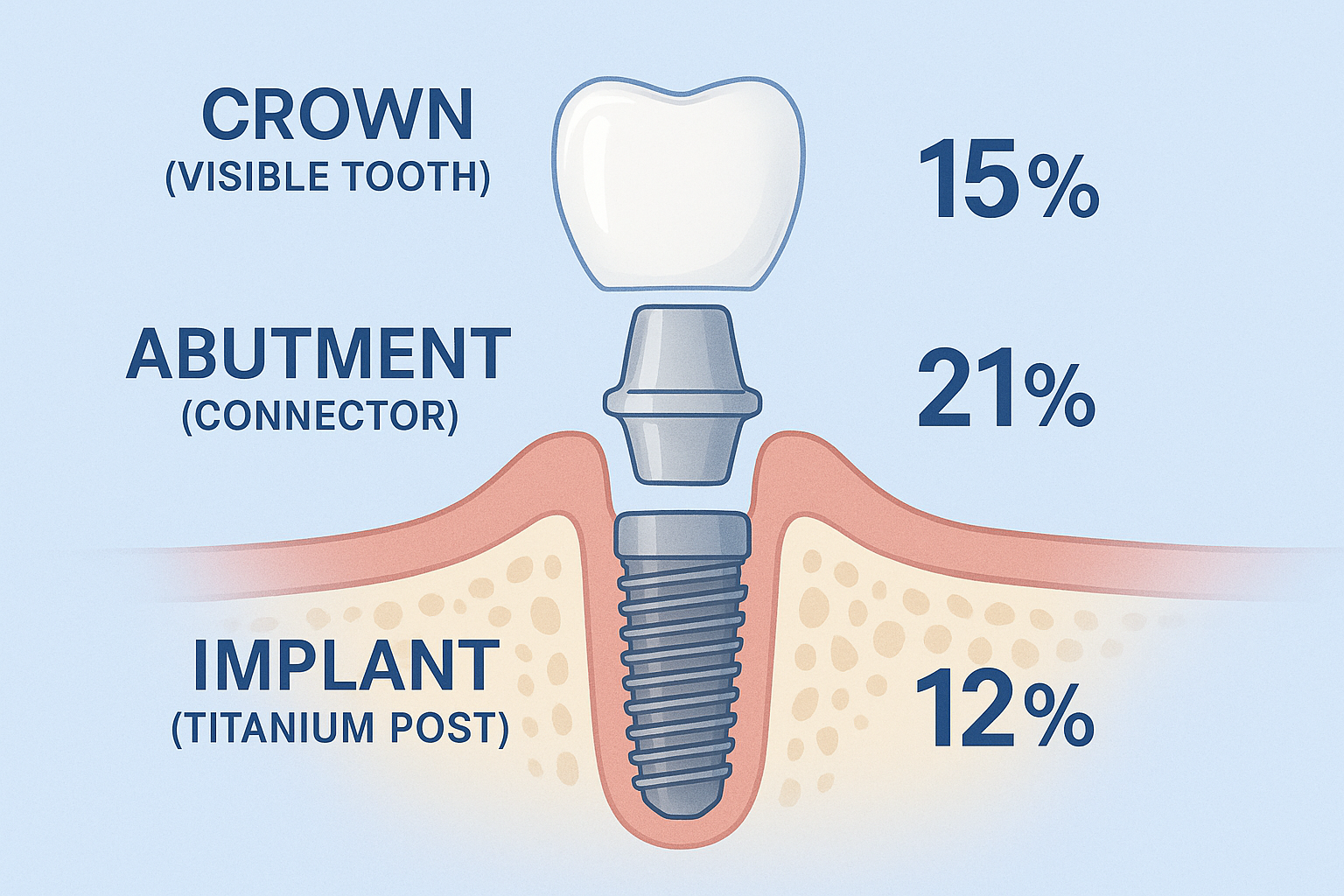
Recognizing problems early can mean the difference between a simple adjustment and a complex reconstruction. Here are the key warning signs to watch for:
Immediate Red Flags 🚨
- Pain or discomfort around the implant site
- Bleeding or swelling of the surrounding gums
- Loose or wobbly crown or abutment
- Bad taste or odor coming from the implant area
- Difficulty chewing on the implant side
Subtle Changes to Monitor
- Changes in how your bite feels
- Increased sensitivity to hot or cold
- Slight movement when touching the crown
- Gum recession around the implant
- Food getting stuck more frequently
Pro Tip: Take photos of your smile regularly. Visual changes in your gum line or crown position can help your dentist identify problems early.
Types of Dental Implant Repairs
Understanding the different types of repairs helps you know what to expect and budget accordingly. Here’s a breakdown of the most common repair procedures:
Minor Repairs (Same-Day Solutions)
Crown Re-cementing 💰 $200-$400
- Quick fix for loose crowns
- Usually completed in one visit
- No anesthesia typically required
Abutment Tightening 💰 $150-$300
- Simple screw adjustment
- Takes 15-30 minutes
- Prevents more serious complications
Bite Adjustment 💰 $100-$250
- Fine-tuning crown height
- Relieves pressure and discomfort
- Often included with other treatments
Moderate Repairs (1-2 Visits)
Abutment Replacement 💰💰 $400-$1,200
- Necessary when abutment is damaged
- May require temporary crown
- Usually covered by warranty if recent
Crown Replacement 💰💰 $800-$2,500
- Needed for cracked or worn crowns
- Opportunity to improve aesthetics
- Consider upgrading materials
Peri-implantitis Treatment 💰💰 $500-$1,500
- Deep cleaning around implant
- May include laser therapy
- Critical for long-term success
Major Repairs (Multiple Visits)
Bone Grafting 💰💰💰 $1,000-$3,000
- Required when bone loss occurs
- Several months healing time
- May need implant replacement
Complete Implant Replacement 💰💰💰 $3,000-$6,000+
- Last resort for failed implants
- Includes removal and new placement
- Extended treatment timeline
The Dental Implant Repair Process: What to Expect
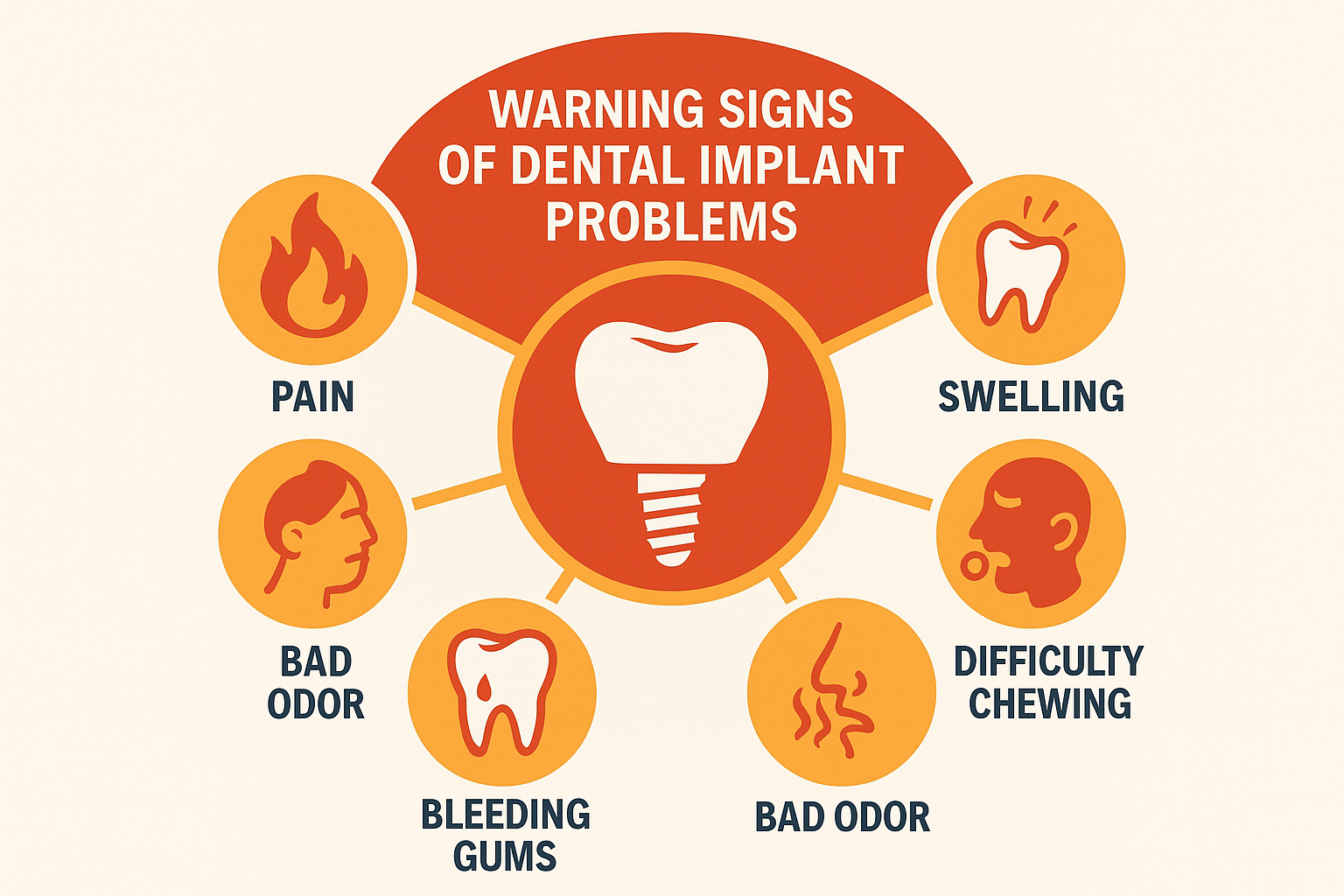
Understanding the repair process helps reduce anxiety and ensures you’re prepared for each step.
Step 1: Comprehensive Evaluation
Your dentist will perform a thorough examination including:
- Visual inspection of the implant and surrounding tissues
- X-rays or CT scans to assess bone and implant position
- Mobility testing to check for loose components
- Bite analysis to identify pressure points
Step 2: Treatment Planning
Based on the evaluation, your dentist will:
- Explain the problem and repair options
- Provide cost estimates and timelines
- Discuss prevention strategies
- Schedule necessary appointments
Step 3: Repair Procedure
The actual repair depends on the specific problem:
- Simple adjustments can often be done immediately
- Component replacement may require ordering parts
- Complex repairs might need multiple appointments
- Healing time varies from immediate to several months
Step 4: Follow-up Care
Post-repair care typically includes:
- Immediate post-treatment instructions
- Follow-up appointments to monitor healing
- Adjusted maintenance routine
- Long-term monitoring schedule
🦷 Dental Implant Repair Cost Calculator
Cost Factors and Financial Planning for Dental Implant Repair
Understanding the financial aspects of dental implant repair helps you make informed decisions and plan accordingly. Several factors influence the total cost of your repair.
Primary Cost Drivers
1. Type and Complexity of Repair 📊
The most significant factor affecting cost is what needs to be fixed. Simple adjustments cost hundreds, while complete implant replacement can cost thousands.
2. Geographic Location 🗺️
Dental costs vary significantly by region. Major metropolitan areas typically charge 20-50% more than rural locations. In Dallas, for example, factors affecting implant cost include local market competition and overhead expenses.
3. Dentist’s Experience and Specialization 👨⚕️
Specialists often charge premium rates, but their expertise can prevent costly complications. When choosing a dental implant dentist, consider both cost and qualifications.
4. Insurance Coverage 💳
Most dental insurance plans offer limited coverage for implant repairs, typically 10-50% of costs. Check your specific policy details before proceeding.
Money-Saving Strategies
Warranty Protection 🛡️
- Many implant components come with warranties
- Keep all documentation from your original procedure
- Understand what’s covered and for how long
Payment Options 💰
- Many practices offer payment plans for implants
- CareCredit and similar financing options
- Some offices provide in-house financing
Preventive Care Investment 🦷
- Regular cleanings cost $100-200 vs. thousands for major repairs
- Professional maintenance extends implant lifespan
- Early intervention prevents complex problems
Prevention: Protecting Your Dental Implant Investment
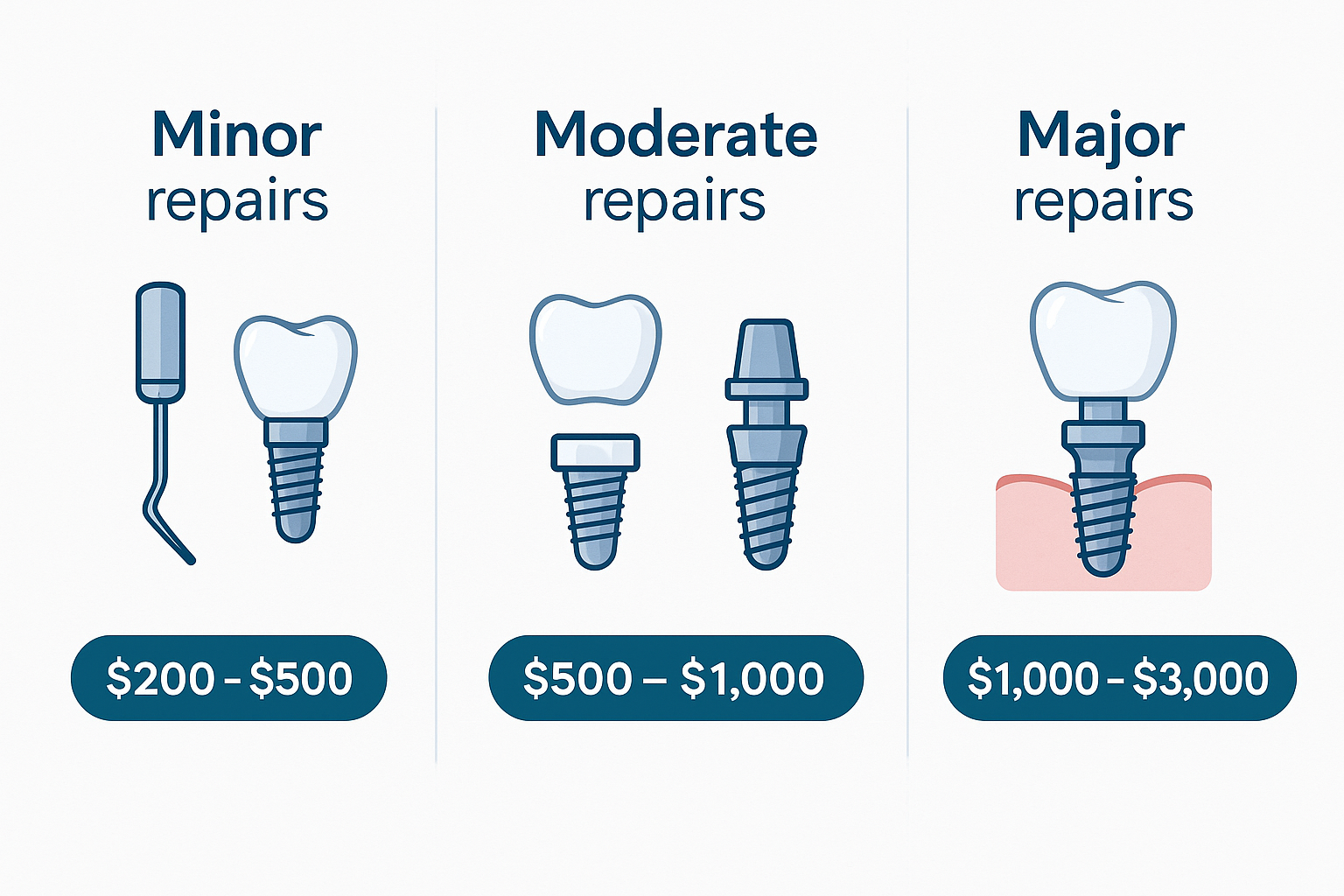
The best repair is the one you never need. Proper care and maintenance can prevent most implant problems and extend the life of your investment.
Daily Care Essentials
Brushing Technique 🪥
- Use a soft-bristled toothbrush
- Brush at least twice daily
- Pay special attention to the gum line around implants
- Consider an electric toothbrush for better plaque removal
Flossing and Interdental Care 🧵
- Floss daily around implant crowns
- Use implant-specific floss or water flossers
- Consider interdental brushes for hard-to-reach areas
- Don’t skip this step – it’s crucial for implant health
Mouthwash Selection 🧪
- Choose alcohol-free formulations
- Look for antibacterial properties
- Avoid harsh chemicals that can irritate tissues
- Rinse for the recommended time
Professional Maintenance Schedule
| Timeframe | Recommended Care | Purpose |
|---|---|---|
| Every 3-4 months | Professional cleaning | Plaque and tartar removal |
| Every 6 months | Comprehensive exam | Early problem detection |
| Annually | X-rays | Bone level monitoring |
| As needed | Adjustments | Bite and comfort optimization |
Lifestyle Factors That Impact Implant Health
Foods to Limit ⚠️
- Hard candies and ice (can crack crowns)
- Sticky foods (can loosen components)
- Excessive sugar (promotes bacterial growth)
- Very hot or cold items (if sensitivity develops)
Habits to Avoid 🚫
- Teeth grinding (use a night guard if needed)
- Using teeth as tools
- Smoking (significantly increases failure risk)
- Neglecting oral hygiene
Positive Habits to Embrace ✅
- Regular dental visits
- Immediate attention to problems
- Healthy diet rich in calcium and vitamin D
- Stress management (reduces grinding)
When to Seek Emergency Dental Implant Repair
Not all implant problems require immediate attention, but some situations demand urgent care. Understanding the difference can prevent complications and save your implant.
Emergency Situations (Seek Care Within 24 Hours) 🚨
Severe Pain
- Sudden, intense pain around the implant
- Pain that worsens over time
- Pain accompanied by swelling or fever
Trauma or Injury
- Direct blow to the implant area
- Visible damage to the crown or surrounding teeth
- Bleeding that won’t stop
Signs of Infection
- Pus or discharge around the implant
- Bad taste or odor
- Fever with implant discomfort
- Rapid swelling
Urgent but Not Emergency (Schedule Within 1-3 Days) ⏰
Loose Components
- Crown that moves when touched
- Abutment that feels unstable
- Changes in how your bite feels
Gum Changes
- Recession around the implant
- Color changes in the gums
- Increased bleeding during brushing
Monitor and Schedule Routine Care 📅
Minor Discomfort
- Slight sensitivity that doesn’t worsen
- Occasional food trapping
- Minor aesthetic concerns
Routine Maintenance Needs
- Regular cleaning and checkups
- Crown replacement due to normal wear
- Bite adjustments for comfort
Choosing the Right Professional for Dental Implant Repair
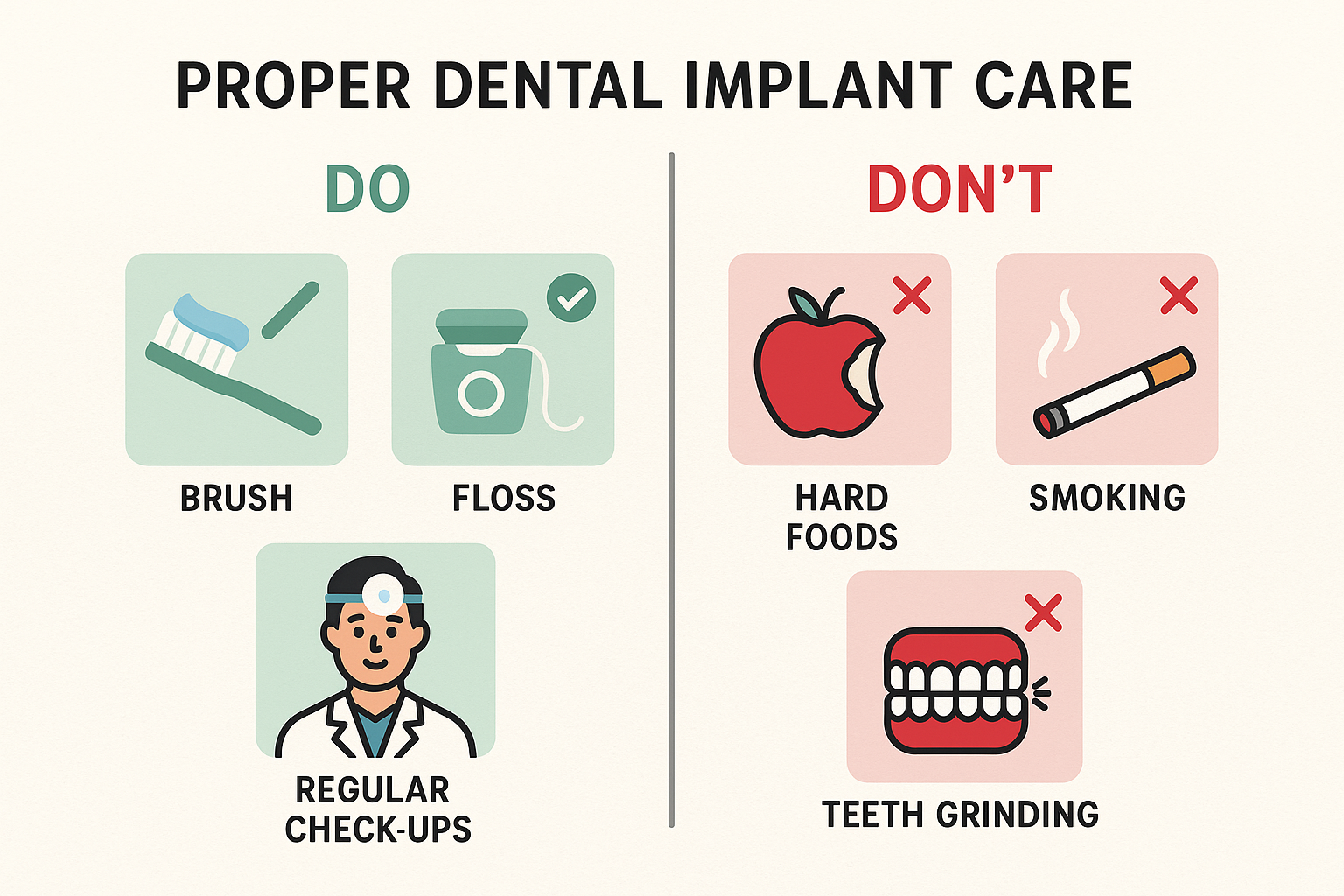
The success of your repair depends heavily on selecting the right dental professional. Different types of providers offer varying levels of expertise and services.
Types of Dental Professionals
General Dentists 🏥
- Handle routine maintenance and simple repairs
- More affordable for basic procedures
- May refer complex cases to specialists
- Good for ongoing care and monitoring
Oral Surgeons 🔬
- Specialists in surgical procedures
- Handle complex implant repairs and replacements
- Expert in bone grafting and tissue procedures
- Higher fees but specialized expertise
Periodontists 🦷
- Gum and bone specialists
- Excel at treating peri-implantitis
- Focus on tissue health around implants
- Preventive care expertise
Prosthodontists 👑
- Specialists in tooth replacement and restoration
- Expert in crown and abutment issues
- Focus on aesthetics and function
- Comprehensive treatment planning
Questions to Ask Potential Providers
Experience and Credentials 📋
- How many implant repairs do you perform annually?
- What is your success rate with repairs?
- Are you board-certified in your specialty?
- Can you provide before/after photos of similar cases?
Treatment Approach 🎯
- What diagnostic tools do you use?
- How do you determine the best repair approach?
- What are the alternatives to the recommended treatment?
- How do you handle complications?
Financial Considerations 💼
- What are the total costs including all fees?
- Do you offer payment plans or financing?
- What does your warranty cover?
- How do you handle insurance claims?
Important Note: When researching affordable dental implants in Dallas, remember that the cheapest option isn’t always the best value, especially for repairs.
Advanced Repair Techniques and Technologies
Modern dental technology has revolutionized implant repair, making procedures more precise, comfortable, and successful than ever before.
Cutting-Edge Diagnostic Tools
3D Imaging and CT Scans 📸
- Provides detailed views of bone and implant position
- Helps identify problems not visible on regular X-rays
- Enables precise treatment planning
- Reduces guesswork and improves outcomes
Digital Impressions 💻
- More accurate than traditional impressions
- Faster turnaround for crown replacements
- More comfortable for patients
- Better fit and function
Laser Technology ⚡
- Minimally invasive treatment for gum problems
- Faster healing times
- Reduced discomfort
- Precise tissue removal and cleaning
Innovative Repair Materials
Advanced Crown Materials 💎
- Zirconia crowns for superior strength and aesthetics
- Metal-free options for better biocompatibility
- Custom shading for perfect color matching
- Improved durability and longevity
Bioactive Bone Grafts 🦴
- Promote faster bone regeneration
- Better integration with existing bone
- Reduced healing times
- Improved success rates
Antimicrobial Coatings 🛡️
- Reduce infection risk
- Promote healing
- Long-lasting protection
- Especially beneficial for high-risk patients
Long-Term Success: Maintaining Repaired Dental Implants
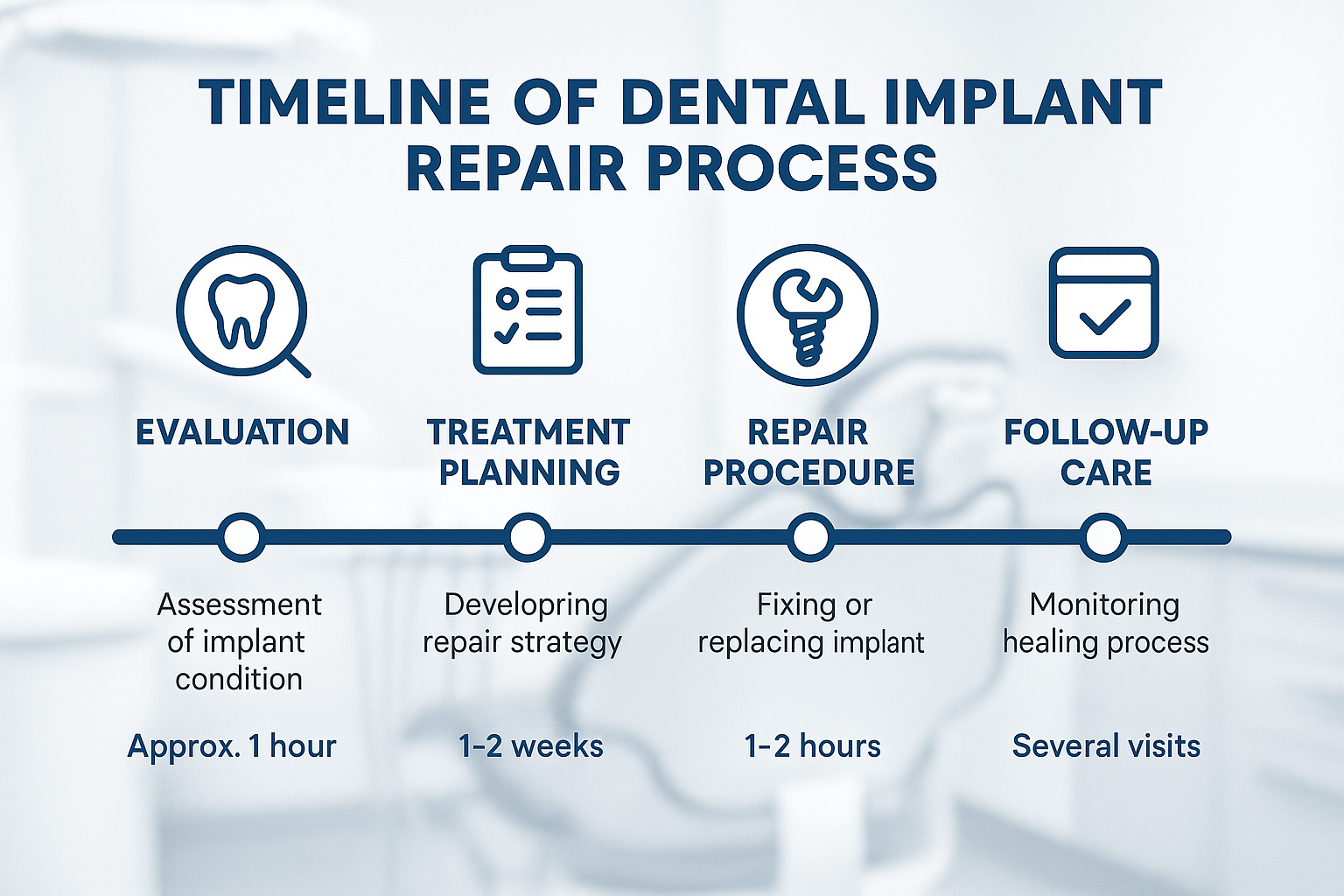
Once your dental implant repair is complete, maintaining long-term success requires ongoing attention and care. The investment you make in proper maintenance pays dividends in avoiding future problems.
Post-Repair Care Protocol
Immediate Recovery (First 2 Weeks) 🕐
- Follow all post-operative instructions carefully
- Take prescribed medications as directed
- Avoid hard or sticky foods
- Use recommended mouth rinses
- Attend all follow-up appointments
Short-Term Adjustment (2-8 Weeks) 📈
- Gradually return to normal eating habits
- Monitor for any unusual symptoms
- Continue modified oral hygiene routine
- Report any concerns immediately
Long-Term Maintenance (Ongoing) ♾️
- Resume regular dental cleanings
- Maintain excellent oral hygiene
- Use protective devices if needed (night guards)
- Schedule regular monitoring appointments
Creating a Sustainable Care Routine
Daily Habits 📅
- Morning and evening brushing routine
- Daily flossing or water flossing
- Antimicrobial rinse if recommended
- Visual self-examination for changes
Weekly Maintenance 📊
- Deep cleaning with specialized tools
- Review oral hygiene technique
- Check for any developing issues
- Document any changes or concerns
Professional Care Schedule 🏥
- Cleanings every 3-4 months initially
- Comprehensive exams every 6 months
- Annual X-rays to monitor bone levels
- Immediate attention to any problems
Future Considerations and Emerging Technologies
The field of dental implant repair continues to evolve, with new technologies and techniques improving outcomes and patient experiences.
Emerging Technologies
AI-Assisted Diagnosis 🤖
- Computer analysis of X-rays and scans
- Earlier detection of potential problems
- More accurate treatment planning
- Predictive modeling for success rates
3D Printing Applications 🖨️
- Custom abutments and crowns
- Surgical guides for precise placement
- Faster turnaround times
- Reduced costs for complex cases
Regenerative Medicine 🧬
- Stem cell therapy for bone regeneration
- Growth factors to enhance healing
- Tissue engineering approaches
- Improved success rates for complex cases
Planning for the Future
Technology Upgrades 🔄
- Consider newer materials when replacement is needed
- Take advantage of improved techniques
- Discuss emerging options with your dentist
- Stay informed about advances in implant care
Financial Planning 💰
- Budget for long-term maintenance costs
- Consider dental insurance changes
- Explore ways to save money on dental implants for future needs
- Investigate new financing options
Conclusion
Dental implant repair doesn’t have to be a source of stress or financial hardship. With proper understanding, early intervention, and the right professional care, most implant problems can be resolved effectively and affordably. The key is recognizing warning signs early, choosing experienced providers, and maintaining excellent oral hygiene.
Remember that your dental implants represent a significant investment in your oral health and quality of life. By taking proactive steps to maintain them and addressing problems promptly, you can enjoy the benefits of your implants for decades to come.
Your Next Steps:
- Schedule a consultation if you’re experiencing any implant concerns
- Review your oral hygiene routine and make improvements where needed
- Research qualified providers in your area using our guide on choosing the right dental implant dentist
- Understand your financing options including payment plans and insurance coverage
- Create a long-term maintenance plan with your dental provider
Don’t wait until small problems become big ones. Your smile is worth the investment in proper care and timely repairs. If you’re in the Dallas area and need dental implant services, consider consulting with local specialists who understand the unique factors that influence treatment success and costs in our region.


Leave a Reply
Share your thoughts or ask a question about dental implants. Your email address will not be published.